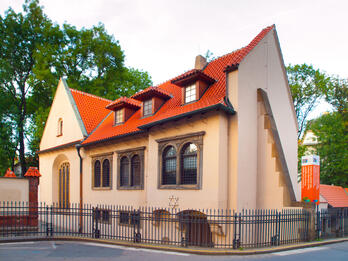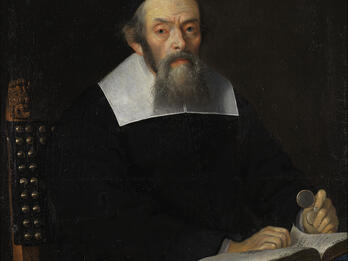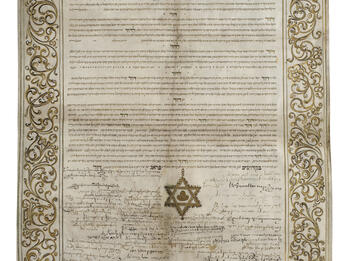Minute Book
The fear of the Lord is the beginning of wisdom (Psalms 111:10)
1. The rabbi shall be permitted to retain in his exalted academy ten members of the community, fifteen outstanding students and fifteen assistants [ . . . ] in accordance with the custom of the previous rabbis of our community.
2. The rabbi shall adjudicate all financial disputes arising in our community, together with the chief judges assigned to that week’s circuit, not with judges of a different circuit. With regard to marriages, divorces, and other matters between husband and wife, and similar issues, the rabbi shall invite expert halakhic authorities to join him.
3. The rabbi’s salary and all the income of the rabbinate shall not be payable to the rabbi at all until he has established his residence here, together with his wife and all members of his holy household [see Psalms 93:5]. He shall receive the same salary as the previous rabbis.
4. The present given to the rabbi for his sermons, i.e., those delivered on the Great Sabbath [immediately preceding Passover] and the Sabbath of Penitence [between Rosh Hashanah and Yom Kippur], shall not exceed two pieces of red gold.
5. The rabbi shall not be permitted to engage in any business affairs other than loans, and the profit from these shall not exceed twenty gold pieces per annum. [ . . . ]
7. The rabbi shall arrive no later than the date that will be designated for him by the distinguished princes of the community. [ . . . ]
9. Those related by marriage to the rabbi, that is, the father of his son-in-law and the father of his daughter-in-law, are not permitted to reside here at the community’s expense. For this purpose, grandchildren are considered like children. In other words, the grandfathers of his son-in-law and daughter-in-law are to be treated in the same manner as the fathers of his son-in-law and daughter-in-law. The position as regards first cousins and cousins once removed is identical—that is, insofar as serving as heads of the community is concerned, a first cousin and a first cousin once removed may not become joint heads of the community, but they may be communal officials. [ . . . ]
10. The relatives of the rabbi—that is, up to his third cousins—are not permitted to retain any donations whatsoever. In general, they shall have the status of those renting from the community or renting from an individual who rents from the community. Those related to the rabbi by marriage, as specified above, shall also not be permitted to retain any donations, as stated.
11. The emissaries1 are obligated to swear an oath, in accordance with Torah law, that they will not deliver the certificate granting the rabbinic post to the rabbi until the latter has undertaken to confirm and fulfill these terms in all respects, and he must deliver this commitment in writing, with his signature appended. This applies in particular to the terms regarding the inauguration ceremony of his Excellency, that not a single penny shall be charged to the community. Any single member of the governing body may prevent any indulgence being granted to the rabbi—may he be acceptable to our community—even to the extent of a single penny from the expenses of the inauguration ceremony of his Excellency. The emissaries have accepted, with an execration and a Torah-based oath, not to alter these conditions, nor to donate even one penny toward the expenses of the inauguration of his Excellency, as it is incumbent upon the rabbi himself to give it, and nothing should be provided by way of assistance for these expenses.
12. It is hereby expressly declared, as a condition reaffirmed over and again, that the rabbi is not permitted to request from the community or its governing body permission to appoint any of his sons or his sons-in-law to any position of rabbi or head of a talmudic academy or halakhic authority, in any form whatsoever, neither while the rabbi is still in office nor after his departure, in any conceivable form.
All of the above is enacted by us, the persons empowered to enact decrees, who have been elected by the holy assembly, as a permanent and irreversible decree, on this day.
Notes
[Agents sent from Tykocin to offer the post of the chief rabbi on behalf of the community.—Trans.]
Credits
The Jewish Community Council of Tykocin, “Minute Book” (manuscript, Tykocin, 1718). Published as: Pinkas kehal Tiktin, 381–566, ed. Israel Halpern and Mordekhai Nadav, vol. 1 (Jerusalem: The Israel Academy of Sciences and Humanities, 1996), pp. 330–331 (no. 479).
Published in: The Posen Library of Jewish Culture and Civilization, vol. 5.





